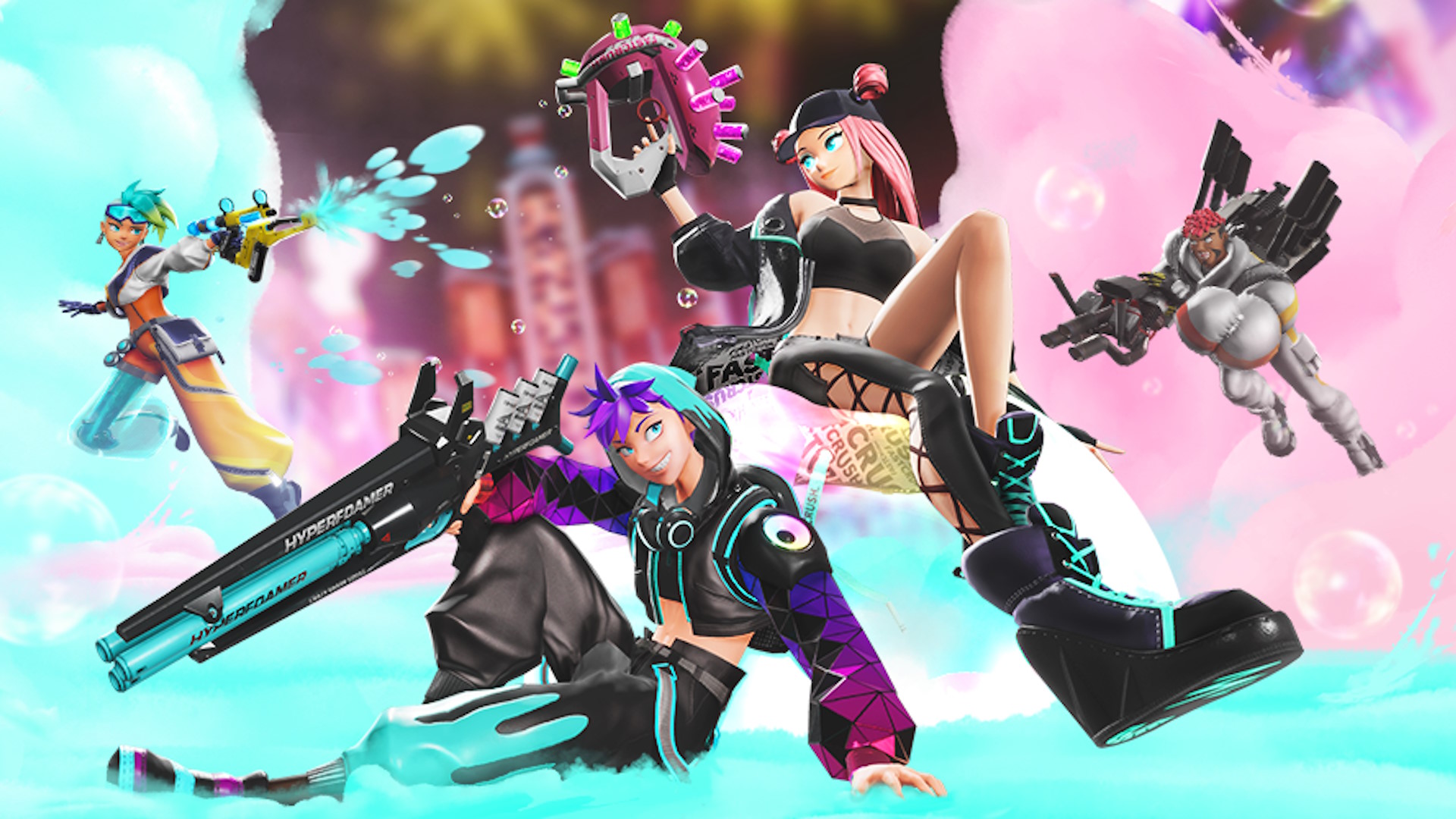Square Enix says its new multiplayer party game contains AI-generated art, but don't sweat it: It's only 'about 0.01% or even less'
The president of Square Enix said he wanted to be "aggressive in applying AI" to content development, and apparently he meant it.

Just a couple weeks after Square Enix president Takashi Kiryu said it intends "to be aggressive in applying AI" to its content creation processes, the company has confirmed with VGC that its new multiplayer party shooter Foamstars does in fact use AI-generated art—but just a teeny little bit.
The presence of AI art in Foamstars was first revealed during a recent press event, during which producer Kosuke Okatani said that while most of the game was made by humans, there was a small amount of art created by Midjourney, a tool that converts text inputs into images.
"All of the core elements in Foamstars—the core gameplay, and the things that make the game enjoyable—those are all made by hand," Okatani said. "However, we did want to experiment with AI as well. In terms of the content in the game, this makes up about 0.01% or even less, but we have dabbled in it by creating these icons in the game."
Square Enix clarified the use of AI-generated art in Foamstars in a follow-up statement, saying it was used to create the in-game album covers for music used in the game's soundtrack.
"As developers, we’re always looking at new technologies to see how they can assist with game development," the company said. "In this instance, we experimented with Midjourney using simple prompts to produce abstract images. We loved what was created and used them as the final album covers players will see in the game. Everything else was created entirely by our development team."
0.01% of a game's total content isn't much, but it's enough to highlight the challenges the rise of AI presents to the game industry. Generally speaking, using AI-generated content in place of human-created work is not looked upon favorably, and game makers of all stripes have faced considerable pushback when they've tried it: System Shock remake publisher Prime Matter angered fans by released an AI-generated image of Shodan, for instance, while more recently Wizards of the Coast experienced a big backlash over the use of AI in a promotional image for new Magic: The Gathering cards, which was made even worse by the fact that it initially denied it.
Despite that, there's a feeling of inevitability to the whole thing. It doesn't have to be (and hopefully won't be) a complete surrender to the machine, and for now most developers are still dabbling around the edges, but it is happening. Maybe the most obvious acknowledgement of that fact is Valve's recent course-change: After an initial coolness toward games on Steam that make use of generative AI, Valve updated its policies to explicitly allow "the vast majority of games that use it" to be released on Steam. That's not so much a canary in a coal mine as it is a guy lighting a match while standing amidst a cloud of coal dust.
Keep up to date with the most important stories and the best deals, as picked by the PC Gamer team.
But the Foamstars situation also raises the question of, "How much is too much?" Is any use of AI unacceptable, or is it fair for developers to say, "We blapped out a dozen little thumbnails with a Discord bot so everyone could have a longer lunch?" And the corollary to that question faced by publishers and storefronts like Steam is, how do you even tell when that degree of AI is present—and how much effort do you want to put into figuring it out in order to enforce whatever "no AI" rules are in place?
The people who called out Wizards of the Coast on the use of AI in its MtG promo image were eventually proven correct, but is this really what we want to do with our time, especially as AI-generated art continues to improve and become more indistinguishable from human creation? Which of course leads into bigger, more long-term questions: It's all extraneous dabbling now, but can we expect developers to keep AI content to 0.01% of their games if and when AI becomes that good at making it?
We're not there yet but it's an issue that all levels of the game industry will have to grapple with at some point. Regulation will only go so far: Both the US and EU are starting to push toward greater regulation of AI development, but those efforts are primarily focused on safety rather than the deleterious effects of runaway capitalism. Valve's new Steam policy requires disclosure from developers whose games contain AI-generated content, which is better than nothing, but I'm really starting to suspect that the only thing that's going to save us is for AI to eventually go the way of 3D televisions: An interesting tech curiosity that ultimately fails to live up to the hype and quietly goes away.

Andy has been gaming on PCs from the very beginning, starting as a youngster with text adventures and primitive action games on a cassette-based TRS80. From there he graduated to the glory days of Sierra Online adventures and Microprose sims, ran a local BBS, learned how to build PCs, and developed a longstanding love of RPGs, immersive sims, and shooters. He began writing videogame news in 2007 for The Escapist and somehow managed to avoid getting fired until 2014, when he joined the storied ranks of PC Gamer. He covers all aspects of the industry, from new game announcements and patch notes to legal disputes, Twitch beefs, esports, and Henry Cavill. Lots of Henry Cavill.


